Thursday, May 7th 2020

AMD B550 Chipset Detailed, It's Ready for Zen 3, Older AM4 Motherboards not Compatible
In their briefing leading up to today's Ryzen 3 3100 and 3300X review embargo, AMD disclosed that its upcoming "Zen 3" 4th generation Ryzen desktop processors will only support AMD 500-series (or later) chipsets. The next-gen processors will not work with older 400-series or 300-series chipsets. This comes as a blow to those who bought premium X470 motherboards hoping for latest CPU compatibility running into 2020. At this time only B550 is available, but we expect more news on enthusiast chipsets as the Zen 3 launch date comes closer. AMD B550 is a fascinating new mid-range chipset by AMD. Launching today as a successor to the popular B450 chipset, B550 is a low-power silicon with roughly the same 5-7 W TDP as the older 400-series chipset. Although AMD won't confirm it, it's likely that the chipset is sourced from ASMedia. It brings a lot to the table that could draw buyers away from B450, but it also takes some away.
The AMD B550 currently only supports 3rd generation Ryzen "Matisse" processors. Ryzen 3000 "Picasso" APU are not supported. What's more, older Ryzen 2000 "Pinnacle Ridge," "Raven Ridge," and first gen Ryzen 1000 "Summit Ridge" aren't supported, either. The Athlon 200 and 3000 "Zen" based chips miss out, too. AMD argues that it ran into ROM size limitations when trying to cram AGESA microcode for all the older processors. We find that hard to believe because B450 motherboards with the latest ComboAM4 AGESA support 2nd gen and 3rd gen processors, including APUs and Athlon SKUs based on the two. On the bright side, AMD assured us (within its marketing slides for the B550), that the chipset will support upcoming processors based on the "Zen 3" microarchitecture. The company also came up with a new motherboard packaging label that clarifies that the processors won't work with the 3400G and 3200G.AMD B550 motherboards will feature partial PCI-Express gen 4.0 support. The main PCI-Express x16 slot, and one of the M.2 NVMe slots that are wired to the "Matisse" processor will be PCI-Express gen 4.0, however, all downstream PCIe lanes put out by the B550 chipset are gen 3.0. This is still a step up from 400-series "Promontory" chipsets, which are limited to gen 2.0. B550 puts out eight PCIe gen 3.0 lanes, which combine with the 20 usable processor lanes from "Matisse" to take the platform's total PCIe budget to 28 lanes (x16 gen 4.0 + x4 gen 4.0 + x8 gen 3.0). The B550 chipset itself connects to the "Matisse" processor via a PCI-Express 3.0 x4 connection.
In terms of connectivity, AMD's B550 chipset puts out up to six SATA 6 Gbps ports with AHCI and RAID capability; two each of 10 Gbps USB 3.2 gen 2 and 5 Gbps USB 3.2 gen 1 ports; and six USB 2.0 ports. PCIe, SATA, and USB connectivity from the "Matisse" processor is unchanged: four 10 Gbps USB 3.2 gen 2 ports, and up to two SATA 6 Gbps ports.The processor includes a PCI-Express 4.0 x16 PEG connection that can be split between slots. AMD is allowing motherboard designers to have multi-GPU capability with the B550, where the x16 PEG link is split between two x16 slots (electrical x8). Previously this capability was limited to the top-tier X370 and X470 boards. The processor also puts out one PCI-Express 4.0 x4 link meant to drive one M.2 NVMe slot or U.2 NVMe port. Every B550 motherboard we've seen so far features one M.2 PCIe gen 4.0 x4 (64 Gbps) slot.As with both its predecessors, the B350 and B450, the new B550 chipset enables full multiplier-based CPU overclocking, along with broad memory overclocking support. Motherboard designers are at liberty to kit out the B550 with the most elaborate CPU VRM solutions. Expect some of the pricier B550 boards to match their X570 counterparts in overclocking capability.
Motherboards based on the AMD B550 chipset are expected to launch on June 16, 2020. Prices start at $100, according to AMD.
The AMD B550 currently only supports 3rd generation Ryzen "Matisse" processors. Ryzen 3000 "Picasso" APU are not supported. What's more, older Ryzen 2000 "Pinnacle Ridge," "Raven Ridge," and first gen Ryzen 1000 "Summit Ridge" aren't supported, either. The Athlon 200 and 3000 "Zen" based chips miss out, too. AMD argues that it ran into ROM size limitations when trying to cram AGESA microcode for all the older processors. We find that hard to believe because B450 motherboards with the latest ComboAM4 AGESA support 2nd gen and 3rd gen processors, including APUs and Athlon SKUs based on the two. On the bright side, AMD assured us (within its marketing slides for the B550), that the chipset will support upcoming processors based on the "Zen 3" microarchitecture. The company also came up with a new motherboard packaging label that clarifies that the processors won't work with the 3400G and 3200G.AMD B550 motherboards will feature partial PCI-Express gen 4.0 support. The main PCI-Express x16 slot, and one of the M.2 NVMe slots that are wired to the "Matisse" processor will be PCI-Express gen 4.0, however, all downstream PCIe lanes put out by the B550 chipset are gen 3.0. This is still a step up from 400-series "Promontory" chipsets, which are limited to gen 2.0. B550 puts out eight PCIe gen 3.0 lanes, which combine with the 20 usable processor lanes from "Matisse" to take the platform's total PCIe budget to 28 lanes (x16 gen 4.0 + x4 gen 4.0 + x8 gen 3.0). The B550 chipset itself connects to the "Matisse" processor via a PCI-Express 3.0 x4 connection.
In terms of connectivity, AMD's B550 chipset puts out up to six SATA 6 Gbps ports with AHCI and RAID capability; two each of 10 Gbps USB 3.2 gen 2 and 5 Gbps USB 3.2 gen 1 ports; and six USB 2.0 ports. PCIe, SATA, and USB connectivity from the "Matisse" processor is unchanged: four 10 Gbps USB 3.2 gen 2 ports, and up to two SATA 6 Gbps ports.The processor includes a PCI-Express 4.0 x16 PEG connection that can be split between slots. AMD is allowing motherboard designers to have multi-GPU capability with the B550, where the x16 PEG link is split between two x16 slots (electrical x8). Previously this capability was limited to the top-tier X370 and X470 boards. The processor also puts out one PCI-Express 4.0 x4 link meant to drive one M.2 NVMe slot or U.2 NVMe port. Every B550 motherboard we've seen so far features one M.2 PCIe gen 4.0 x4 (64 Gbps) slot.As with both its predecessors, the B350 and B450, the new B550 chipset enables full multiplier-based CPU overclocking, along with broad memory overclocking support. Motherboard designers are at liberty to kit out the B550 with the most elaborate CPU VRM solutions. Expect some of the pricier B550 boards to match their X570 counterparts in overclocking capability.
Motherboards based on the AMD B550 chipset are expected to launch on June 16, 2020. Prices start at $100, according to AMD.
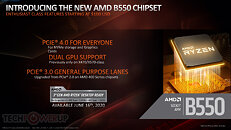
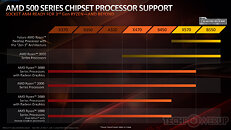
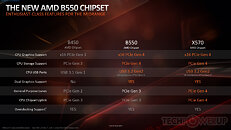
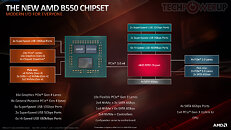
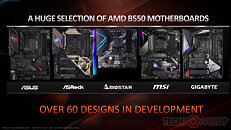
434 Comments on AMD B550 Chipset Detailed, It's Ready for Zen 3, Older AM4 Motherboards not Compatible
This is exactly why I canceled my 1800x x370 order in 2017 once I knew it didn't have the IPC to keep up with Intel. I always knew this dream was a half promise at best. Now I'm finally ready to upgrade and a 10900k and z490 is looking really good at least Ill get at least one cpu upgrade out of it. Lol
Truth be told it's a stupid idea to begin with u wouldn't want to keep my outdated motherboard today and slot in the 10900k for my 7700k. I don't even have addressable rgb just the old style not to mention no Pic express 4.0 or 2.5/10g ethernet.
I find the upgrade window of every 3 years with a new cpu AND motherboard to be perfect fit.
Well AMD the one excuse you had that others tried to use as a reason to go with you is gone and with it the final thought of me going with one at this point what's the point?
Like the guy above said and stability and reliability just isn't anything close to Intel.
I'm tired of troubleshooting booting problems for my friends who were duped into a ryzen setup.No but my buddy who just bought a b450and a 3700) which he thought he'd get to upgrade to a much newer cpu in a year or 2 isn't going to be able to.
He might as well have waited a week or 2 and went Intel.my buddy with a confirmed kit and running within spec still has boot issues and finds he has to randomly remove 1 of the 4 sticks to get it running and it changes which one and in which slot.
It's gotten so old he just ends up running 24gb ram 99% of the time.
This was the final sign that I was making the right choice to stick with old reliable (and not to mention the best performance) I'll pay a bit more to never have to troubleshoot insane boot problems. I've already had to do it more than enough for friends.It still doesn't (even being hundreds more) beat a 500 Intel cpu at gaming. That's all that matters to me and it's never going to be a crown amd wears.My goal is 4k/120hz gaming (my displays native Max) and with a upgrade to whatever the fastest hdmi 2.1 gpu there is in my future I will not "settle" for amd and the one trick they had that was weighing on me is now gone and I'm free to choose Intel without any guilt.
As usual, YMMV, but I never had any stability issues with my b350/1700x with 3000mhz memory. Some people are acting as if they really were interested in AM4, when they seemed to had a preference for Intel all along, and they are now rubbing it in the face of those who prefered AMD. "Now we are the one with an uppgrade path"
As for your friends they might want to take their pc to the shop for a proper setup:p :D.
I've put up with the random issues this board and CPU have with OCs, memory stability, and odd boot times on the promise of the 4900x. Serves me right for thinking AMD would hold up their end of the bargain, and given that Intel is STILL faster in games, might as well go back to intel.
Some of them still even call me for over the phone help after moving 4 states away.
I'm much more knowledgeable than the kids they hire at geek squad. ( I would know I worked with many a bozo when I was younger).
Oops but again it's my turn to upgrade and Intel has landed the answer just like the last time with the 1800x/7700k launches.
It's also hardly comparable with what you just bought, so it seems like you're just having an angry reaction to a press release for no apparent reason.And you know this how?
It literally doesn't matter as they've shown their "promises" to be quite hollow at times and who wants to take that risk.
Not when Intel is STILL delivering better gaming performance and that's all I care about.
The 7700k was the right move in 2017 and the 10900k is again in 2020.
I'm a gamer on this pc above everything else and amd NEVER has been able to meet or exceed Intel where it matters most to me.
And any benefits they did have over Intel (and were weighing on me heavily to just go with them) have now been proven to be a "hope" at best.
The socket is being supported, everyone's assumptions are what aren't supported.
They simplifies motherboard OEM build support by retaining features like pciex and the socket, that's actually the simple bit to explain, less to learn equals good.
I'm in the same boat but my assumptions were measured by fact from the start so I'm less surprised by this it seams.
@Cybrshrk that was banter, but naming one occasion and implying it's the norm will bring out such comments , personally I found there's memory that's supposed to work that's flakey.
So I stopped buying that for Ryzens, since buying patriot viper for such systems all my issues and theirs evaporated but there are other memory suppliers putting adequate test and spec in place, Corsair is not and are a good example of dodge and avoid, Even labeled supported memory from them is not great.
Then there's the boards, total shitshow at the mid to low end, but again that's my perspective it doesn't mean shit verses the world and I wouldn't suggest any different since YMMV.
Aiming for 4K @ 120 Hz doesn't help with this at all and is only for the average action-filled game or if you're going for visual fidelity. This can be achieved with any modern AMD or Intel CPU now, with AMD being more efficient with their products at the moment.
Im just using an example and don't know how close these gpu/cpu combos will get to my goal but it's a hard goal to reach and every bit extra helps.
And I mean why would I SETTLE for less than when I don't have to?
Why they don't support older gen? Probably because everyone whines and cries like little babies if they try to run B550 with a old R5 1600 and its got issues or instability or whatever, everyone readies their pitchforks. AMD would rather not deal with that shit, and have a clean slate, where they can focus on having amazing and stable experience for the 3000 and 4000 series!
Why hear you cry like baby if it has issues, demanding endless support, maybe some would like Athlon 64 support too on these boards?
Intel literally changes chipset compatibility every year, every generation, no one cries about it, everyone accepts it as if its word from god, but AMD does it in order to have a clean slate and be better positioned for stability and good experience and everyone brings their torches and pitchforks!
They can't win, everyone is so freaking entitled!
That is what is so great about Ryzen, now. People have a real choice, after years of just recommending Intel for everything. Until my 3700x, I ran nothing, but Intel, for my main rig, since core 2. Price/peformance is where I shop, and right now, AMD has that crown.
Cyberpunk 2077 for example.
Given AMD's history, it was reasonable to assume there would be forwards compatibility for all generations. AM2 motherboards could run AM3 CPUs, hell a few could run AM3+, and AMD didnt even have to promise those.
If the newest CPUs only support certain chipsets, then pray tell how is this any different then Intel switching sockets every 2 years? If you want to move forward you have to buy a new mobo either way.
I don't want to settle I want what's best and if I'm going to spend that money it's going to be what's the best value as well and my only measurement is gaming performance (it's a gaming pc after all).
That's the whole point its back to the old days of "who knows" and I'm OK with that it just makes my guilt in choosing in not choosing amd even less.
This is nothing about entitlement.
Intel's chipset compatibility is a bs move, on their part, as well. Hate to think of how many threads, that I have seen, on other forums, of non tech savvy people dropping an Intel CPU into their board, that was socket, but not chipset compatible.